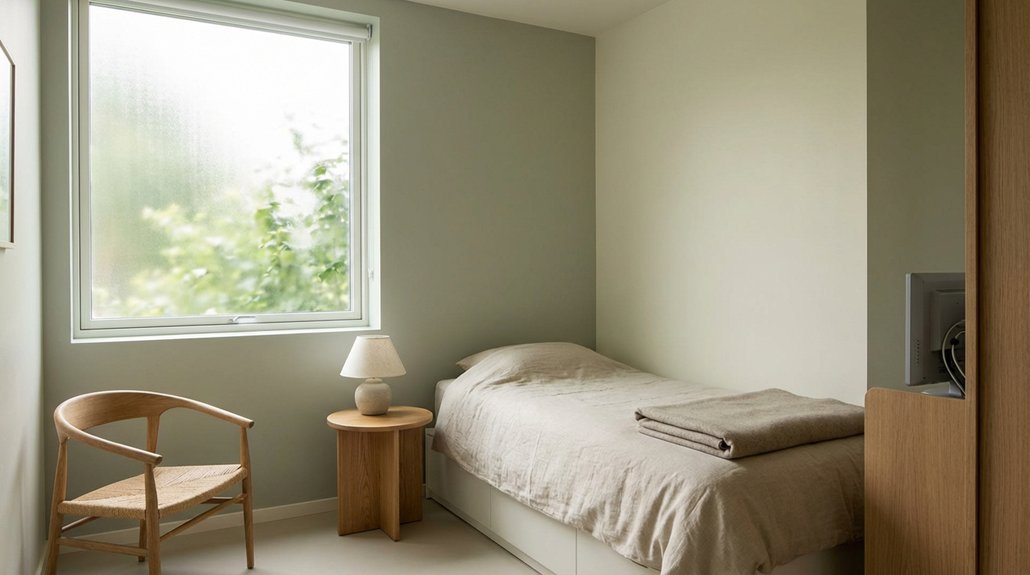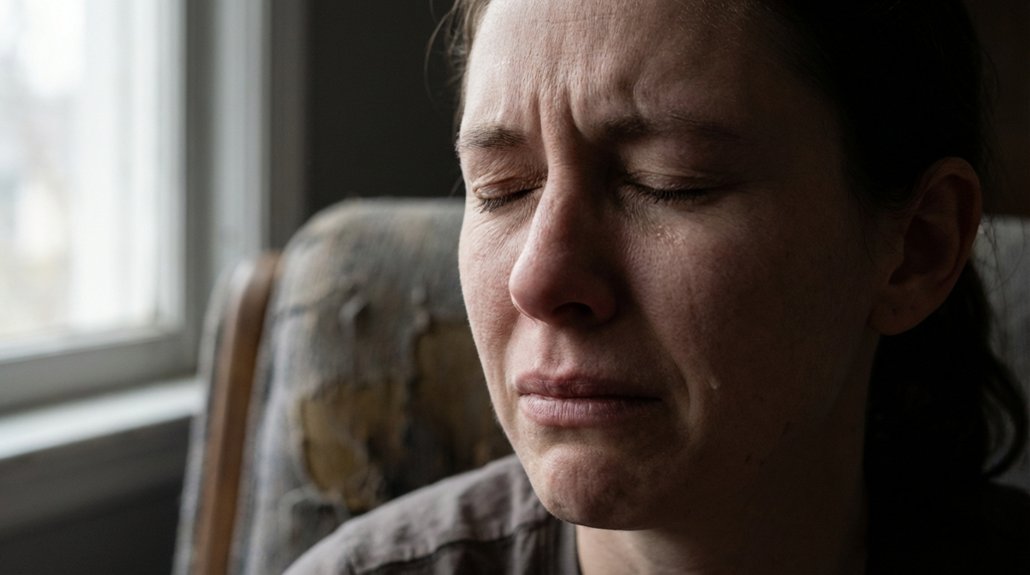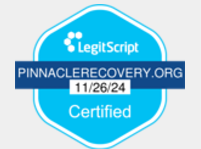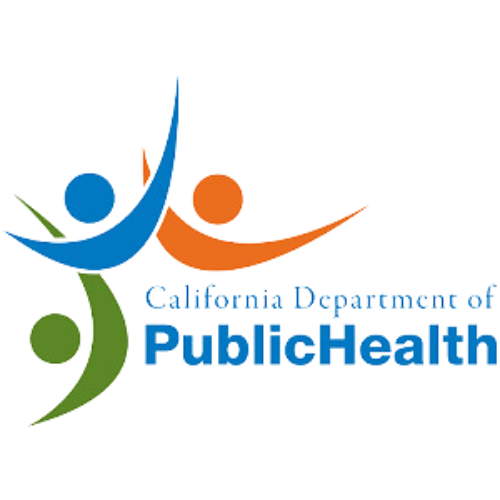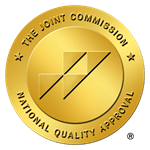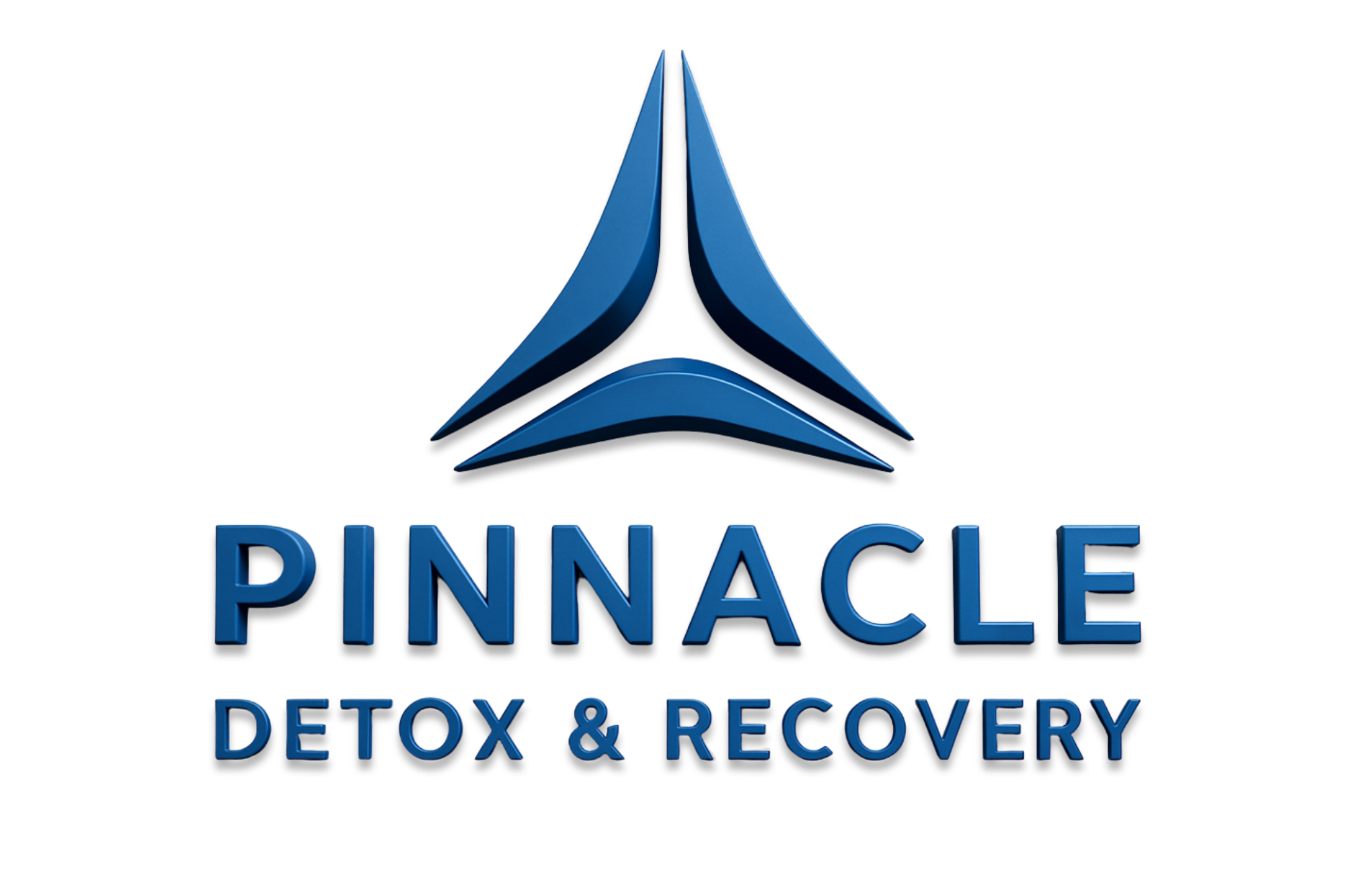Group therapy gives you the collective strength of peers who truly understand your journey. You'll find that nearly 8 in 10 rehab patients participate in group sessions, where shared experiences combat isolation and build accountability. Research shows group therapy delivers outcomes comparable to individual sessions while fostering social connections that directly address addiction's isolating nature. You'll practice communication skills, witness others' progress, and form relationships that extend beyond treatment. These peer connections can reduce your relapse risk and strengthen long-term recovery through sustained motivation and support systems that understand what you're experiencing.
 Group therapy has become a cornerstone of inpatient rehabilitation, with nearly 8 in 10 patients participating in these structured peer sessions during their stay. Across rehabilitation facilities, you'll find group therapy accounting for roughly 14% of all therapy sessions and 16% of total therapy hours. This translates to approximately three hours per week of peer support and collaborative healing for participants. The integration spans multiple disciplines, from therapeutic recreation and speech therapy to occupational therapy and psychology. While every facility implements group therapy differently based on staff expertise and institutional preferences, the widespread adoption reflects a systems-level recognition of its value. You're benefiting from a multidisciplinary approach where peer interaction isn't supplementary, it's central to your recovery process and built into extensive rehabilitation models nationwide.
Group therapy has become a cornerstone of inpatient rehabilitation, with nearly 8 in 10 patients participating in these structured peer sessions during their stay. Across rehabilitation facilities, you'll find group therapy accounting for roughly 14% of all therapy sessions and 16% of total therapy hours. This translates to approximately three hours per week of peer support and collaborative healing for participants. The integration spans multiple disciplines, from therapeutic recreation and speech therapy to occupational therapy and psychology. While every facility implements group therapy differently based on staff expertise and institutional preferences, the widespread adoption reflects a systems-level recognition of its value. You're benefiting from a multidisciplinary approach where peer interaction isn't supplementary, it's central to your recovery process and built into extensive rehabilitation models nationwide.
 One of the most powerful forces in recovery comes from standing alongside others who truly understand the journey. When you participate in peer support groups, you're more likely to stay committed to your treatment plan and follow through on therapy sessions. Regular group meetings create natural checkpoints where you set goals, share progress, and receive constructive feedback from people who genuinely care about your success. This collaborative atmosphere reinforces the importance of a supportive recovery environment, where individuals can openly express themselves without fear of judgment. Knowing that others are invested in your journey can significantly boost motivation and resilience during challenging times. In addition to peer support, engaging with family members can enhance the recovery experience, highlighting the family's role in rehab process. This accountability structure keeps you engaged even during challenging moments. Research shows peer support increases treatment engagement by up to 20% and considerably improves program completion rates. You'll witness others reaching milestones, which reinforces your own belief in recovery. The shared lived experience of your peers provides unique insights that professional staff alone cannot offer. Peer supporters can be as effective as clinical social workers in supporting your recovery journey, bringing their personal understanding of addiction and healing to guide you through challenges. As you take on leadership roles within the group, you'll build confidence while inspiring fellow members to maintain their commitment. Seeing someone like you succeed makes your own progress feel possible and validates that recovery is achievable.
One of the most powerful forces in recovery comes from standing alongside others who truly understand the journey. When you participate in peer support groups, you're more likely to stay committed to your treatment plan and follow through on therapy sessions. Regular group meetings create natural checkpoints where you set goals, share progress, and receive constructive feedback from people who genuinely care about your success. This collaborative atmosphere reinforces the importance of a supportive recovery environment, where individuals can openly express themselves without fear of judgment. Knowing that others are invested in your journey can significantly boost motivation and resilience during challenging times. In addition to peer support, engaging with family members can enhance the recovery experience, highlighting the family's role in rehab process. This accountability structure keeps you engaged even during challenging moments. Research shows peer support increases treatment engagement by up to 20% and considerably improves program completion rates. You'll witness others reaching milestones, which reinforces your own belief in recovery. The shared lived experience of your peers provides unique insights that professional staff alone cannot offer. Peer supporters can be as effective as clinical social workers in supporting your recovery journey, bringing their personal understanding of addiction and healing to guide you through challenges. As you take on leadership roles within the group, you'll build confidence while inspiring fellow members to maintain their commitment. Seeing someone like you succeed makes your own progress feel possible and validates that recovery is achievable.
 How do we comprehend group therapy genuinely shifts the needle on recovery? Research tracks concrete measures: functional independence scores, pain levels, mobility gains, and where you're discharged after treatment. Studies show 79, 80% of inpatient rehab patients participate in group therapy, which comprises roughly 14% of sessions but delivers measurable results. Group physical therapy produced significant improvements in pain management and mobility scores. While individual therapy explains larger portions of functional gains in broad outcomes, specific group activities account for meaningful progress, up to 11.8% of outcome variation in targeted areas. The peer environment creates structure, accountability, and social support that enhance motivation. Group therapy's impact extends beyond numbers: it builds the confidence and connection that sustain recovery long after discharge.
How do we comprehend group therapy genuinely shifts the needle on recovery? Research tracks concrete measures: functional independence scores, pain levels, mobility gains, and where you're discharged after treatment. Studies show 79, 80% of inpatient rehab patients participate in group therapy, which comprises roughly 14% of sessions but delivers measurable results. Group physical therapy produced significant improvements in pain management and mobility scores. While individual therapy explains larger portions of functional gains in broad outcomes, specific group activities account for meaningful progress, up to 11.8% of outcome variation in targeted areas. The peer environment creates structure, accountability, and social support that enhance motivation. Group therapy's impact extends beyond numbers: it builds the confidence and connection that sustain recovery long after discharge.
The Widespread Use of Group Therapy Across Rehab Facilities

Group Therapy vs. Individual Sessions: Comparing Effectiveness
When you're weighing group therapy against individual sessions, research shows both approaches deliver strong, comparable outcomes for substance use and mental health recovery. What sets group therapy apart is its power to build social connection and peer accountability, elements that directly combat the isolation addiction creates. In the group setting, participants can learn from others who are navigating similar challenges, introducing new coping strategies and solutions through shared experiences. In rehabilitation settings, 79% of patients participate in at least one group therapy session during their treatment, demonstrating how widely this approach is integrated into recovery programs. Group therapy sessions are often more cost-effective than individual therapy, increasing accessibility to mental health services for individuals on a budget. You'll find that combining both modalities often maximizes your treatment effectiveness, giving you personalized attention alongside the momentum of shared progress. While group therapy brings invaluable benefits, the role of individual therapy shouldn't be overlooked. One-on-one counseling benefits in rehab can provide tailored support and focused attention on personal issues that may not be addressed in a group setting.Comparable Treatment Outcomes Overall
While both group and individual therapy play essential roles in inpatient rehab, research consistently shows they deliver comparable clinical outcomes for most conditions. You'll experience similar reductions in depression and anxiety scores regardless of which modality you choose. Studies demonstrate that neither approach holds a significant advantage in preventing relapse or rehospitalization rates. What matters most is finding the right fit for your needs. Sharing experiences in rehab through group settings activates peer healing mechanisms, while individual sessions offer personalized depth. Both formats strengthen your recovery foundation equally well. Research indicates that 75% of people seeking therapy experience improved outcomes, reinforcing that success is achievable through either modality. Group therapy often centers on specific focus areas like trauma or chronic pain, while individual therapy concentrates solely on your personal concerns and experiences. The support community you build and your willingness to engage determine success more than the therapy type itself. This evidence-based equivalence means you can confidently pursue either path toward lasting wellness.Unique Social and Emotional Benefits
Beyond clinical outcomes, your experience in group therapy opens up social and emotional advantages that individual sessions can't replicate. The group therapy in inpatient rehab benefits include building genuine connections with peers who understand your struggles firsthand. You'll develop stronger self-awareness by hearing diverse perspectives and recognizing patterns in your own behavior through others' stories. Group sessions create opportunities to practice communication skills, receive constructive feedback, and model positive behaviors in real-time. This peer-to-peer environment fosters accountability in recovery, you're not just responsible to yourself or your therapist, but to fellow participants invested in collective progress. The mutual encouragement reduces isolation and shame while strengthening your support network. These relationships often extend beyond treatment, providing sustained motivation throughout your recovery journey.How Peer Support Builds Motivation and Accountability

Emotional and Social Benefits of Shared Recovery Experiences
When you share your recovery journey in a group setting, you're not just talking, you're building authentic connections that transform how you experience healing. The collective space allows you to express emotions you might have suppressed, while simultaneously learning from others who've navigated similar struggles and discovered effective strategies. This exchange creates a powerful support system where you gain both practical insights and the emotional validation needed to sustain your progress. The dynamic of healthy competition within the group naturally motivates participants to push themselves further in their recovery goals. Observing others participate encourages you to mimic positive behaviors, as newer members often adopt the successful movement strategies demonstrated by those who have been in treatment longer. These connections often extend beyond treatment sessions, forming lasting friendships that continue to provide support throughout your recovery journey.Building Community Through Connection
Group therapy transforms the inpatient rehab experience by creating meaningful connections that combat the isolation many people face during recovery. You'll find yourself connecting with others who truly understand your struggle, reducing stigma and loneliness through shared experiences. This peer network provides structure and routine while fostering mutual trust and bonding that accelerates your healing process. Regular group engagement lets you give and receive empathy, building a sense of belonging that enhances your resilience. You'll observe others' progress, which offers hope and motivation during challenging moments. The supportive environment encourages you to develop new social skills and practice real-world applications. With 76% satisfaction rates, group therapy creates lasting relationships that extend beyond treatment, establishing a foundation for sustained recovery and improved quality of life.Emotional Expression in Safety
As you navigate the vulnerability of early recovery, group therapy offers a protected space where you can express difficult emotions without fear of judgment or rejection. This safe environment allows you to identify and process complex feelings like anger, shame, grief, that may have fueled your addiction. When you share authentically, you experience:- Catharsis through emotional release, lightening the burden you've carried alone
- Validation from peers who truly understand your struggles
- Empowerment as you articulate experiences you've kept hidden
- Self-acceptance through witnessing your story received with compassion
Learning From Peer Experiences
While you've already found safety in expressing your emotions, the true transformation happens when you witness others traversing their own paths, and recognize pieces of your journey reflected in theirs. Peer experiences offer insider knowledge that clinical expertise alone can't provide. You'll gain practical coping strategies, learn to navigate healthcare systems, and discover real-world solutions to daily recovery challenges. Observing peers reach milestones strengthens your belief in your own capacity for change and builds self-efficacy. Their honest accounts normalize your struggles, reducing shame while revealing patterns you might've missed. This collective wisdom enhances your problem-solving skills and treatment adherence. As peers demonstrate sustained recovery, you'll internalize that lasting change isn't just possible, it's achievable through consistent effort and mutual support. The experience also provides peer supporters themselves a maintained sense of recovery and renewed purpose, creating a reciprocal healing dynamic that benefits everyone involved. Studies have shown decreased days in inpatient care among individuals who engage with peer support during their recovery journey.Common Group Therapy Formats and Focus Areas
Throughout inpatient rehab, you'll encounter several distinct group therapy formats, each designed to address specific aspects of recovery and build on your existing strengths. These evidence-based approaches work together as an integrated system supporting your healing journey. Key group therapy formats include:- Psychoeducational groups that equip you with essential knowledge about addiction's mechanisms, helping you understand triggers and make informed decisions about your recovery path.
- Skills development sessions where you'll practice concrete techniques like stress management and communication through role-playing and behavioral exercises.
- Cognitive-behavioral groups that empower you to identify and reshape thought patterns connecting to substance use.
- Interpersonal process groups offering deeper exploration of relationship dynamics and emotional patterns within a safe, cohesive environment.
Measuring the Impact on Patient Outcomes

Resource Efficiency and Practical Benefits for Treatment Centers
Beyond supporting patients' emotional and clinical progress, group therapy delivers concrete operational advantages that strengthen your facility's entire treatment system. One clinician treats multiple patients simultaneously, extending care capacity within existing staffing limits while reducing per-patient labor costs. This efficiency lets you reinvest savings into advanced training, technology, and enhanced patient amenities.Group therapy multiplies your care capacity while reducing costs, freeing resources for staff development and patient-centered improvements.Key operational benefits include:
- Maximized productivity, Average group sessions (44.8 minutes) exceed individual sessions (36.7 minutes), optimizing clinician time blocks
- Reduced bottlenecks, Overlapping appointments smooth patient flow and decrease therapy wait times
- Burnout mitigation, Diversified workdays and interdisciplinary collaboration reduce repetitive session fatigue
- Adaptive scheduling, Flexible group composition accommodates census fluctuations and evolving patient needs
